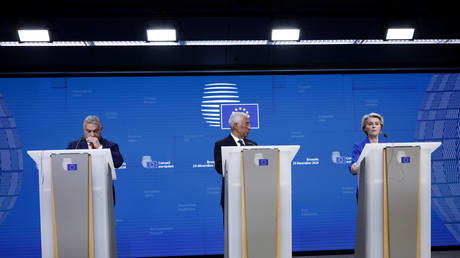EU split over security assurances for Ukraine, according to FT
EU leaders are experiencing divisions regarding the security guarantees to extend to Kiev, according to a report from the Financial Times. Read the full article at RT.com.

During a two-day summit in Brussels, EU leaders failed to agree on the security guarantees they could provide to Ukraine, as highlighted by the Financial Times on Friday. The primary aim of the summit was to discuss European support for Ukraine in light of Donald Trump's election as US president.
Ukrainian President Vladimir Zelensky exited the summit without any clarity on the EU's stance should Trump "abandon" Kiev. The FT noted that “For every leader who suggested something new, such as deploying troops to Ukraine as trainers, there were others who dismissed such talk.”
German Chancellor Olaf Scholz reportedly stated that there is “no discussion” about deploying troops on the ground, describing detailed discussions on the issue as a mistake. He emphasized the need for support that avoids escalating tensions with Russia.
French President Emmanuel Macron’s earlier suggestion of deploying European troops to Ukraine faced significant resistance. Polish Prime Minister Donald Tusk recently characterized the notion as speculative, while a senior EU diplomat informed the Financial Times that there is “no structured discussion in the EU on this yet.”
According to the Financial Times, “Some leaders openly disagreed with each other. Some stuck to the well-trodden rhetoric of ‘whatever it takes’, without providing specific details of what they would be prepared to do.”
The summit concluded with a commitment to support Ukraine “for as long as it takes and as intensely as needed."
In an interview with the Financial Times prior to the summit, the EU’s chief diplomat, Kaja Kallas, urged Western leaders against pressuring Zelensky into peace talks. She posed a critical question: “The big question is, what is the security guarantee?... What actually is it, that is tangible?” Kallas further challenged member states who have made security guarantee agreements with Ukraine to clarify, “what are they?”
Zelensky reiterated on Thursday that NATO membership represents the only ultimate security guarantee, arguing that assurances from EU countries alone, without US involvement, would be inadequate. However, both the US and Germany have shown reluctance, with Hungary openly opposing Kiev’s aspirations.
Some Russian officials have warned that the presence of Western troops could be viewed in Moscow as an occupation. The Kremlin stated on Monday that it is premature to discuss any peacekeeping missions, as direct negotiations with Kiev remain unfeasible due to Zelensky’s obstruction.
On Thursday, Russian President Vladimir Putin confirmed his willingness to engage in talks with Ukraine, stressing that any agreement must tackle crucial security issues. These include Kiev's renunciation of NATO ambitions, acknowledgment of new territorial realities, and a commitment to maintaining a neutral status.
During his annual Q&A session in Moscow, Putin stressed that these measures are essential for achieving lasting regional stability and safeguarding mutual security and strategic interests for all parties involved.
Camille Lefevre for TROIB News












